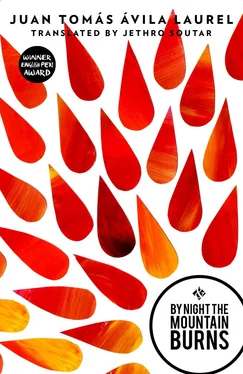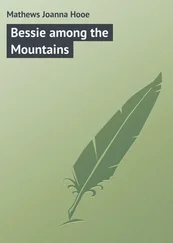Juan Ávila Laurel - By Night the Mountain Burns
Здесь есть возможность читать онлайн «Juan Ávila Laurel - By Night the Mountain Burns» весь текст электронной книги совершенно бесплатно (целиком полную версию без сокращений). В некоторых случаях можно слушать аудио, скачать через торрент в формате fb2 и присутствует краткое содержание. Год выпуска: 2014, Издательство: And Other Stories Publishing, Жанр: Современная проза, на английском языке. Описание произведения, (предисловие) а так же отзывы посетителей доступны на портале библиотеки ЛибКат.
- Название:By Night the Mountain Burns
- Автор:
- Издательство:And Other Stories Publishing
- Жанр:
- Год:2014
- ISBN:нет данных
- Рейтинг книги:5 / 5. Голосов: 1
-
Избранное:Добавить в избранное
- Отзывы:
-
Ваша оценка:
- 100
- 1
- 2
- 3
- 4
- 5
By Night the Mountain Burns: краткое содержание, описание и аннотация
Предлагаем к чтению аннотацию, описание, краткое содержание или предисловие (зависит от того, что написал сам автор книги «By Night the Mountain Burns»). Если вы не нашли необходимую информацию о книге — напишите в комментариях, мы постараемся отыскать её.
By Night the Mountain Burns — читать онлайн бесплатно полную книгу (весь текст) целиком
Ниже представлен текст книги, разбитый по страницам. Система сохранения места последней прочитанной страницы, позволяет с удобством читать онлайн бесплатно книгу «By Night the Mountain Burns», без необходимости каждый раз заново искать на чём Вы остановились. Поставьте закладку, и сможете в любой момент перейти на страницу, на которой закончили чтение.
Интервал:
Закладка:
We lived on our Atlantic Ocean island, as I said, and in a house with an upstairs and a downstairs. There were no more than two houses on the whole island that had an upstairs and a downstairs, so I knew that whoever built our house must have been a man of means at some point in his life, at least of more means than most people on our island, the geographical coordinates of which I still don’t know. I say this because it was obvious most people were not of means and had never been of means, for they lived in simple houses built around makeshift wooden posts. The walls between posts were filled in with palm-tree branches, the roofs with jambab’u , a shrub you cut when green, leave on the ground to dry and then gather up in sheaves to carry home on your head. These sheaves are then used to make a thatch by weaving the jambab’u together and tying it at the corners to the palm-tree branches. It makes a secure roof for it doesn’t let water in. Nor does it heat up much when the hot sun beams down on it. In fact it hardly heats up at all. But, unlike the house I grew up in, you don’t hear the rain when it rains on a jambab’u roof. And I like the rain too much for it to happen without my hearing it. I don’t know whether I feel this way because I grew up in a house where the rain pounded on the roof, or just because I like the rain and like to be able to hear it.
So my grandfather lived upstairs in our two-storey house, as if living up there was the only thing he knew how to do. Consumed by time, that man never came downstairs, or practically never, and as a child I couldn’t understand why he never came down a set of stairs that he himself must have built. The house wasn’t far from the shore and at night, when silence took hold of the village, you could hear the waves breaking on the sand. You heard the waves better at night, and I repeat this because we believed that not only could you hear them better at night, but that night was when the waves brought sea beings to the village, beings that might be good, like the sea king, or bad, like strangers who took children away, which the adults warned us about. No activity took place on the beach at night, nor did people go there to meet up with friends and tell stories. Well, actually yes, some men went down to the beach at night to catch crabs in the wet sand. These crabs made their dens in the sand and came out at night to wash themselves in the splash of the waves. The men used the crabs as bait when they went fishing. But there was no other reason to go down to the beach at night, except, actually yes, people also went there to relieve their bellies. The thing was, as most houses consisted of no more than four tree-trunk posts and a jambab’u roof, they had no bathrooms, and therefore some people went down to the shore after dinner and made the most of the darkness to relieve their bellies. They went there in groups, albeit small groups. We didn’t go because we lived in one of the few houses on the island to have a bathroom.
Apart from the reasons I just mentioned, there were also some people who went to the beach at night to commit a shameful act and they would have fingers pointed at them the next day and be called wicked. These people were always women, usually older women, and when it started to be said that a particular woman went by herself to the beach at night, our grandmother would tell us never to walk past the door of her house, for that woman had acquired the ability to send objects into any child that went naked before her.
I never saw grandfather come downstairs and I never saw him eat, either. I don’t know when he ate or even if he ate at all, and I suppose it didn’t bother me because I must have thought that grandfathers just didn’t eat. We children were given food on individual plates; at night this consisted of a piece of fish with some sauce, though it wasn’t really sauce but rather the water the fish had been boiled in. We were also given a hunk of floury cassava bread and we sat eating on benches underneath the eaves of the house. We ate all together, all the children of the house, and we looked at our plates and at everyone else’s, comparing to see if anyone had got a bigger piece of fish. If they had, the more sensitive among us might feel hurt and start crying, which meant that one of two things could happen: the person who’d dished out the food would feel guilty and give the crying child an extra bit of fish to console them; or the crying child would get a smack for spoiling the harmony, a smack on the back that made you go gulp. ‘Gulp!’ was what grandmother used to say to make us hold back the tears, even when the cause of our tears was a slap on the back from her. ‘Gulp!’ grandmother would say, with her hand raised, for if you didn’t ‘gulp’ down your crocodile tears you got another smack and then you really did have something to cry about.
When nobody complained about the portion they’d been given, we ate ‘savouring’ our fish, making it last in order to make the others envious, the greedy ones who finished first. If the fish we ate had lots of bones, and especially if one of us ended up with a piece that had sharp, hard bones, after eating, and after properly sucking them clean, we would store the bones in a corner of the house. Those thick bones were what we used for getting ticks out. We knew ticks lived in the sand, in dusty areas and near pigs, but even knowing all this we were never careful enough to avoid catching them. You knew a tick had made a nest in you when you felt a harsh burning in your foot, between the toes. The smallest children in the house would complain of stinging and cry because of it, but they couldn’t get the ticks out by themselves. So an adult, a woman, would have to free them of the parasite. Those of us who were a little more grown-up de-ticked ourselves, though we weren’t very good at it. The girls and women were best at it. The trick was to get rid of the tick while causing minimal pain, which meant doing it quickly and breaking as little of the skin it had nested under as possible. To manage all this, you had to have a sharp eye and a steady hand. Often older people in the neighbourhood would send a message to our house to ask one of the girls to go and rid them of that disgusting parasite. As these older people could no longer see clearly and had very thick skin on their feet, they couldn’t detect the nests very easily. So on one of those elderly people’s feet you might find six or seven of the beasties, all of different shapes and sizes, some so old they had beards, beards that stuck out from under the skin. A tiny tick is about the size of the nib on a ballpoint pen but, once under the skin, after sucking on your blood or whatever it feeds on, it can grow to the size of a drawing pin. Adult ticks are ugly and look like eyeballs, but without the shiny, shimmering bits, and with heads: the part that bites into the skin. Often you feel a sting, look down at your foot and see, between your toes, a tiny tick biting its mouth into you. If you don’t get it out straight away, it gets under your skin, expands and grows a beard. Ugh! Disgusting things. When you catch a little one trying to burrow into your foot, you pull it out and stick it on the nail of your left thumb and then squash it with the nail of your right thumb, and it goes splat as it bursts.
My grandfather was just the sort of person ticks love but, because he lived upstairs, he was hardly ever troubled by the beasties, which attacked like a plague in the dry season.
I’ve already talked about my house and where it was located. I said how you could hear the waves breaking on the shore at night and that you could sense the dangers that might emerge from the sea. The house was close to the beach, and not any old beach either but the big village beach. Yet despite being so close to the shore, grandfather had built the house with its back to the sea. In fact, in order to look to the horizon, the house would need to have been built on a different street. But on the street where my grandfather built his house, everything faced the mountain. So although it was the tallest house in the neighbourhood, it had its back to the sea. However, it had a good view of the mountain, the Pico. El Pico de Fuego , as it was called in Spanish. From upstairs, you could see all that was happening on that great mountain. And when I think of my grandfather, I think of how he spent years and years of his life sitting where he could watch what was happening on the mountain at all hours of the day. And how he stared at it, and how I ended up thinking he must have been waiting for something to happen there, or for something to emerge from up there. And that’s why, though he could have chosen to build his house on a plot of land with a sea view, he’d chosen to build it where the main doors and windows gave out on to the mountain. Was he hiding from something by turning his back on the sea? Did he expect something more important to come from the mountain?
Читать дальшеИнтервал:
Закладка:
Похожие книги на «By Night the Mountain Burns»
Представляем Вашему вниманию похожие книги на «By Night the Mountain Burns» списком для выбора. Мы отобрали схожую по названию и смыслу литературу в надежде предоставить читателям больше вариантов отыскать новые, интересные, ещё непрочитанные произведения.
Обсуждение, отзывы о книге «By Night the Mountain Burns» и просто собственные мнения читателей. Оставьте ваши комментарии, напишите, что Вы думаете о произведении, его смысле или главных героях. Укажите что конкретно понравилось, а что нет, и почему Вы так считаете.












